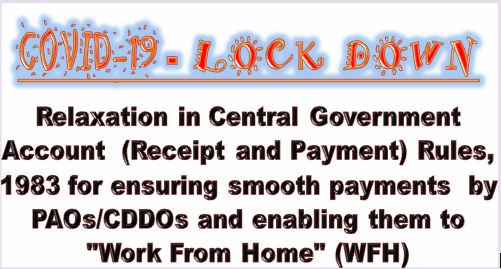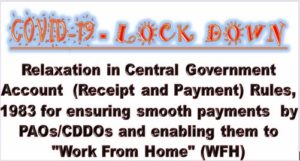Relaxation in Central Government Account (Receipt and Payment) Rules, 1983 for ensuring smooth payments by PAOs/CDDOs and enabling them to “Work From Home” (WFH) during COVID-19 Lockdown period
No. 3(2)/TA-II/2020/173
Ministry of Finance
Department of Expenditure
Controller General of Accounts
Dated: 08.04.2020
OFFICE MEMORANDUM
Subject: Relaxation in Central Government Account (Receipt and Payment) Rules, 1983 for ensuring smooth payments by PAOs/CDDOs and enabling them to “Work From Home” (WFH)– reg.
A situation has arisen in which there is a necessity to enable “Work from Home”. The above situation necessitates an amendment to Receipts & Payments Rules, 1983 (RPR) to ensure smooth payments by Pay and Accounts Officers (PAOs)/CDDOs.
2. Measures are, therefore, required to ensure timely payments of the bills submitted to PAOs/CDDOs, if the staff and officers of PAOs/Pr. AOs/CDDOs are not able to attend the office and need to Work From Home (WFH) using e-office, PFMS and official e-mail (@gov.in, @nic.in). Accordingly, the following provisions in the existing Receipts & Payments Rules, 1983 are relaxed to ensure smooth payments of bills by PAOs/CDDOs and to enable officers/officials to Work From Home:-
| S.No | Existing Rule | Relaxed Rule |
| 1 | Save as otherwise specially provided in these rules or unless Government in the Ministry of Finance (Department of Expenditure) otherwise direct in any case, no withdrawal of money may be made from the Government Account except by presentation of bill in support of relevant claim for the purpose. (Rule 28 of RPR) | Save as otherwise specially provided in these rules or unless Government in the Ministry of Finance (Department of Expenditure) otherwise direct in any case, no withdrawal of money may be made from the Government Account except by presentation of bill (physically or through electronic system) in support of relevant claim for the purpose.(Rule 28 of RPR) |
| 2 | Save as hereinafter provided bills drawn and presented by a departmental officer to an Accounts Officer or to a cheque drawing DDO shall themselves be duly receipted for payments. Separate receipts, duly affixed with revenue stamp wherever necessary, shall be obtained and | Save as hereinafter provided bills drawn and presented by a departmental officer (physically or through electronic system) to an Accounts Officer or to a cheque drawing DDO shall themselves be duly receipted for payments. Separate receipts, duly affixed with revenue stamp wherever necessary, shall be obtained and furnished |
| 3. |
furnished to the bill passing and paying authority at the time of receiving payment from him in respect of all other payments claimed through bills. (Rule 29 of RPR) |
to the bill passing and paying authority at the time of receiving payment from him in respect of all other payments claimed through bills.(Rule 29 of RPR) |
| 3 |
All bills must be filled in and signed in ink. [Rule 33(iii) of RPR] |
All bills must be filled in and signed in ink or DDO may submit the bill through the system electronically after logging in into the system through his system ID (as per existing protocol). Scanned copy or the abstract {Rule 33(ii) refers.} of the physical bill is to be submitted to PAO/CDDO through official e-mail. [Rule 33(iii) of RPR] |
| 4 |
Every voucher must bear a pay order signed or initialed by the responsible disbursing officer, specifying the amount payable both in words and figures. All pay orders must be signed by hand and in ink. (Rule 59(1) of RPR) |
Every voucher must bear a pay order signed or initialed or approved in the system using system ID by the responsible disbursing officer, specifying the amount payable both in words and figures. All pay orders must be signed by hand and in ink or approved in the system using system ID. [Rule 59(1) of RPR] |
| 5 |
All paid vouchers must be stamped ‘paid’ or so cancelled that they cannot be used a second time. (Rule 59(2) of RPR) |
All paid vouchers must be stamped ‘paid’ or so cancelled or disabled in the system in a way that they cannot be used/ processed in the system a second time. In case processed in the system, the original physical bill shall, however, be submitted by DDO to PAO/CDDO at a later date with stamp of “NOT FOR PAYMENT” for post check and record. DDO may indicate the details of payment advice number and date so that PAO/CDDO shall stamp as “paid” or so cancelled. This physical bill will not anyway be re-processed in the system. [Rule 59(2) of RPR]. |
3. The payments made under above conditions shall be subject to 100 percent post-check by the concerned PAOs/CDDOs once the situation Recoveries may be done by PAO/CDDO wherever necessary.
4. The above relaxation will come into effect from the date of issue of this OM and shall continue until further orders of Secretary (Expenditure) . If such relaxation becomes necessary again on any future occasion when, in the opinion of the Secretary, there is a need for such arrangements, the relaxation may apply for such period(s) as may be decided from time to time by Secretary (Expenditure).
5. This issues with the approval of Finance Minister.
Sd/-
(A K Singh)
Deputy Controller General of Accounts
Source: Click here to view/download the PDF
[http://cga.nic.in//writereaddata/file/RPRrelaxation173Dt08042020(1).pdf]



COMMENTS